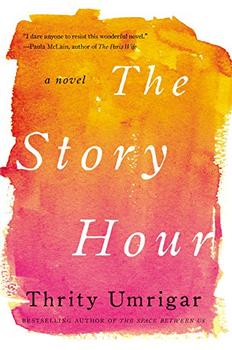Book Club Discussion Questions
In a book club? Subscribe to our Book Club Newsletter and get our best book club books of 2025!
For supplemental discussion material see our Beyond the Book article, The Asian Elephant and our BookBrowse Review of The Story Hour.
Please be aware that this discussion guide will contain spoilers!
- What is the value of sharing stories with each other?
- How do you define the boundary between a therapist and a friend?
- How do the chapters narrated by Lakshmi differ from those told from Maggie's perspective?
- What do Lakshmi's flashbacks to her life in India add to our understanding of her?
- Lakshmi loves to sit by the river, while Maggie finds peace floating and swimming in the community pool. Where else does water appear in the novel? Why is water literally and mythically powerful for us ?
- What does Lakshmi's experience with Mithai the elephant bring to the story?
- At one point, Sudhir critiques psychotherapy, suggesting that such "mollycoddling" is simply a blame game that keeps people from taking responsibility for their own problems. How do you feel about his response?
- Maggie decides on several occasions to cross the traditional boundaries of the therapeutic relationship. Why?
- Sudhir suggests to Maggie that Lakshmi doesn't need therapy but instead "a job. Independence. Money of her own." Why do you think he might say this? How do practical aspects of life affect your emotional and psychological well - being?
- Sudhir cooks and worries about his weight. Lakshmi is good with math and eventually owns her own business. In what other ways are traditional gender stereotypes altered or transcended throughout the novel?
- Despite their time together, at one point Maggie suggests that with such vast differences in "education, language, nationality, [and] race" she couldn't ever be close friends with Lakshmi. What is essential for friendship to form and last?
- Consider Maggie's painful and haunting relationship with Wallace, her father, and her destructive attraction to Peter. How are these relationships related? In what ways might parents influence what and whom their children are attracted to?
- Umrigar uses figurative language — particularly simile — extensively. What are some of the most powerful examples?
- Maggie hesitates to take her own suffering seriously because that of her patients has been so much worse. Is suffering relative? Is all suffering equal? How should it be measured?
- Despite her love for her sister Shilpa, Lakshmi criticizes "young, stupid, childish girls who l iked shiny objects, who believed in love rather than responsibility." What is a healthy balance of romance and reality?
- In many ways the novel is about self - sufficiency. What is an appropriate amount of it in one's life? When should one rely on or connect with others?
- Maggie has found that patients value their therapy more if they pay even a nominal fee. Lakshmi often gives food as a gift. What's the difference between a commodity and a gift? How does it affect the relationship of those involved?
- Consider the name Lakshmi, the goddess of wealth, love and prosperity. How is this relevant to the novel?
- The novel ends with a powerful statement from Lakshmi: "I begins." What are the many things that might be beginning at this moment?
Unless otherwise stated, this discussion guide is reprinted with the permission of Harper Perennial.
Any page references refer to a USA edition of the book, usually the trade paperback version, and may vary in other editions.
